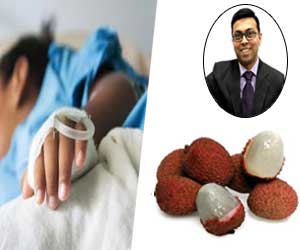- Home
- Editorial
- News
- Practice Guidelines
- Anesthesiology Guidelines
- Cancer Guidelines
- Cardiac Sciences Guidelines
- Critical Care Guidelines
- Dentistry Guidelines
- Dermatology Guidelines
- Diabetes and Endo Guidelines
- Diagnostics Guidelines
- ENT Guidelines
- Featured Practice Guidelines
- Gastroenterology Guidelines
- Geriatrics Guidelines
- Medicine Guidelines
- Nephrology Guidelines
- Neurosciences Guidelines
- Obs and Gynae Guidelines
- Ophthalmology Guidelines
- Orthopaedics Guidelines
- Paediatrics Guidelines
- Psychiatry Guidelines
- Pulmonology Guidelines
- Radiology Guidelines
- Surgery Guidelines
- Urology Guidelines
Guest Blog: Know whether eating litchi causes encephalitis- Dr Pradeep Gadge

In this Blog, Dr Pradeep Gadge, Diabetologist at Gadge Diabetes Centre, explains the connection between lichi and encephalitis.
Encephalitis (chamki fever) is a disease that causes inflammation of the brain. In Muzaffarpur, many victims of encephalitis had very low sugar levels. The disease has caused deaths of over 110 children in Bihar, this year. Here, we bust the myth regarding consumption of litchi causing encephalitis…
What is Acute Encephalitis Syndrome (AES)?
Acute encephalitis syndrome (AES) tends to affect the central nervous system, mostly in children and young adults. It is a viral disease, which causes mild flu-like symptoms such as high fever, convulsions, and headache.
What are the causes?
AES is complex and can be caused owing to the virus, bacteria, fungi, and a range of agents. Moreover, one may also suffer from it due to the scrub typhus, dengue, mumps, and measles, even Nipah or Zika virus. Thus, in several cases, though the causes of AES remains clinically unidentified. According to a study published in the journal Annals of Neusrosciences in 2016, apart from viral encephalitis, a severe form of leptospirosis and toxoplasmosis can cause AES. The causative agent of AES varies with season and geographical location, and predominantly affects the population below 15 years.
We explain you in brief about the connection between litchi fruit and encephalitis
Now, the recent outbreak of Acute Encephalitis Syndrome (AES) in Bihar which claimed 110 lives so far has caused the wave of fear amongst many patients. Hence, parents have an important question which is should their children eat litchi? This is s because, it is being confirmed that encephalitis is spreading in litchi growing areas of Bihar, including Muzaffarpur district and other parts of the country, and that consumption of the fruit was among the factors for the spread of the disease.
Speaking about the benefits of litchi, it is a good source of vitamin C, vitamin B2 (riboflavin), potassium and copper. It is loaded with antioxidant, anti-cancer, anti-inflammatory, anti-microbial, anti-viral properties. Furthermore, it is anti-diabetic, anti-obesity, liver-protective and immune-boosting in nature. Also, it is rich in polyphenols (plant-based antioxidants), including proanthocyanidins, which may help prevent serious heart problems and cancer.
We bust the myth regarding consumption of litchi causing encephalitis
It is essential to note that the cause of encephalitis includes sleeping on an empty stomach at night, dehydration due to humidity and eating litchi on an empty stomach. Are you aware? Early morning, there is normal tendency for blood sugar to dip, after several hours of no food intake. Undernourished children who may have gone to sleep without a meal at night develop hypoglycemia (a condition that occurs when a person's blood glucose level (BGL) has dropped too low, below 4mmol/L). The brain needs normal levels of glucose in the blood. The liver is unable to supply the need. So the alternate pathway of glucose synthesis, which is known as fatty acid oxidation, is turned on. That pathway is blocked by Methyl Carboxy Phenyl Glycine (MCPG). Thus, litchi does not cause any harm in well-nourished children, but only in undernourished children who had eaten litchi fruit the previous day and had gone to bed on empty stomach.
Know why this toxin can be harmful for undernourished children?
When it comes to well-nourished children, reserve glucose gets stored as glycogen (glucose polysaccharide) in their liver. Thus, during instances when the glucose level goes down, the glycogen is broken down into glucose and circulated in the blood for use. But, when it comes to undernourished children (who belong to poor families), they tend to lack adequate glycogen reserve that can be converted into glucose. This is the reason; the natural mechanism in undernourished children is unable to correct the glucose level their blood, and this can cause hypoglycemia.
Generally, when glycogen reserve in one’s liver is exhausted or is insufficient, the body tends to convert the fatty acid (non-carbohydrate energy source) into glucose. But in the presence of the litchi toxin, the fatty acid conversion into glucose is blocked midway owing to which no glucose is generated and the low blood glucose level is not corrected by one’s body.
Take-home message: As you know that the hungry children eating unripened litchi that fell on the ground, containing high levels of a naturally occurring amino acid derivative called hypoglycin which inhibits the body's ability to produce glucose, causing hypoglycemia (low blood sugar. This fruit is eaten in various countries around the world without issue. The key lesson we can take from the children in India is to avoid eating unripened litchi on an empty stomach. If you are well-nourished and eating ripe litchis in moderation, you don’t need to worry!
Dr Pradeep Gadge is a leading Diabetologist at Gadge Diabetes Centre

Disclaimer: This site is primarily intended for healthcare professionals. Any content/information on this website does not replace the advice of medical and/or health professionals and should not be construed as medical/diagnostic advice/endorsement or prescription. Use of this site is subject to our terms of use, privacy policy, advertisement policy. © 2020 Minerva Medical Treatment Pvt Ltd